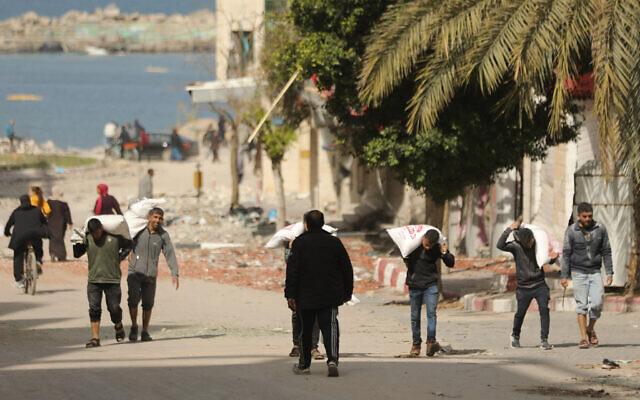
Hamas said to execute leader of Gaza’s powerful Doghmush clan
Hamas reportedly killed the leader of the powerful Doghmush clan in Gaza City, because the group allegedly had been stealing humanitarian aid and was suspected of having contact with Israel.
Unconfirmed reports on Arab media said that the clan leader, who was not named, was “executed” in the family compound along with two others.
Earlier this week, a Hamas-linked website warned Palestinian individuals and groups against cooperating with Israel to provide security for aid convoys amid the spiraling humanitarian crisis in Gaza as war rages between Israel and Hamas.
Those who did would be treated as collaborators and handled with an iron fist, the Hamas Al-Majd security website said, quoting a security official in Palestinian terror forces.
The warning came in response to reports that Israel was considering arming some Palestinian individuals or clans in Gaza to provide security protection for aid convoys entering the enclave as part of wider planning for humanitarian supplies after the fighting ends.
Doghmush is a large, armed clan that has clashed with Hamas in the past and has a history of engaging in organized crime as well as arms trading. It leads the Army of Islam terror group and is allied with al-Qaeda.
It kidnapped and held British journalist Alan Johnston from March to July 2007, and was also reportedly involved in the kidnapping of IDF soldier Gilad Shalit in 2006.
The Doghmush clan is based in the Tel al-Hawa neighborhood of Gaza City and in Sabra in western Gaza, the Ynet website reported.
Despite the recent reports of cooperation with Israel, clans have put out a statement saying they still support Hamas, Ynet said.
On Wednesday, Hamas said in a statement that it welcomed the clans’ announcement and praised them for refusing to cooperate with Israel, Ynet said.
Gaza has a number of large traditional family clans affiliated with political factions including Hamas and Fatah, the rival group that dominates the Palestinian Authority in the West Bank.
Some of the larger clans in Gaza City and elsewhere are believed to be well-armed but they have a long history of clashing over rival interests and there has been no indication that they would consider working with Israel.
Israel has not yet provided a clear plan for a postwar scenario in Gaza and has repeatedly rejected a proposal favored by the US and much of the international community to restore the Palestinian Authority’s rule over the enclave.
In seeking an alternative to both the PA and the Hamas terror regime, which it has vowed to eradicate, Israel has been floating the possibility of Gazan clans running the Strip’s civilian affairs, while the IDF would retain security control.
Some experts are dubious about the feasibility of Israel’s proposal; a similar attempt was made decades ago, unsuccessfully. But experts’ skepticism is mainly due to the diminished clout that clans now hold in contemporary Gazan society, and the inevitable influence that established Palestinian political movements would exert over them.
Israel has also reportedly considered arming Gaza civilians in order to secure aid convoys.
War was triggered by the October 7 attack on Israel by Palestinian terror group Hamas which killed 1,200 people amid horrific atrocities. The thousands of attackers who burst through the border with the Gaza Strip and into southern Israel also abducted 253 people who were taken as hostages to Gaza.
Israel responded with a military campaign to topple the Hamas regime in Gaza, destroy the terror group, and free the hostages, 130 of whom remain in captivity.
The Hamas-run Gaza health ministry says that at least 31,184 Palestinians have been killed since October 7, and some 72,899 have been injured. The terror group’s figures are unverified, however, and don’t differentiate between civilians and combatants, of whom Israel has said it killed some 13,000 inside Gaza and an additional 1,000 inside Israel in the aftermath of the October 7 massacre.
Source » timesofisrael.com





